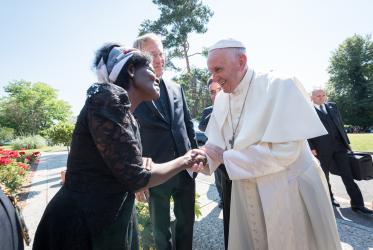By Marianne Ejdersten*
Cardinal Kurt Koch of the Roman Catholic Church, president of the Pontifical Council for Promoting Christian Unity, has granted an interview to WCC News, a communication vehicle of the World Council of Churches (WCC). The following conversation took place at the Global Christian Forum in Tirana, Albania where 150 high level leaders and representatives of various church traditions from more than 60 countries gathered to listen and learn from one another and to stand in solidarity with churches and Christians experiencing discrimination and persecution in the world today.
Cardinal Koch said: “I feel most privileged and honoured to be a part of this unique gathering, which represents a meaningful illustration of global Christianity today and a significant expression of universal Christian solidarity which exceeds ‘denominational’ or ‘confessional’ boundaries.”
The migrant crisis seems to pre-occupy Europe and will do so for many years. Yet it also has split churches, between those that worry about threats to their identity and those that are more welcoming. In an age that emphasizes diversity, how do you see the unity agenda evolving? What kind of hope can Your Eminence see?
Cardinal Koch: “We have many challenges in the world, and they are common for all the Christians and all human beings. I think the challenges are bringing us closer together. Right now I think especially about ethical questions such as the refugee crisis, human trafficking and all these difficult questions in the world.”
Koch added: “It’s important that Christian churches have a common voice, because when the Christian churches don’t have a common voice concerning the main questions of our society, then the Christian voice becomes ever weaker.”
Koch also said: “First of all we must have better solidarity between Christians. We must deepen our solidarity. Then we will have a better appeal to the world of solidarity. We must show more solidarity between Christians. We have to stay together much more.”
The Joint Working Group between the Roman Catholic Church and the WCC has recently marked its 50th anniversary, and Pope Francis sent a very gracious letter marking the anniversary and encouraging further, practical collaboration. How do you see that developing? How may we deepen our solidarity?
Cardinal Koch: “The World Council of Churches and the Catholic Church have a long tradition of working together, and I think we have good collaboration. I think we should continue our collaboration but also deepen our collaboration. We are working together for justice and peace.”
Koch said: “We are meeting at this great consultation in Tirana, Albania, to strengthen and deepen the personal bonds of unity between us, participants in this consultation, and between our churches and ecclesial communities around the world. That’s one part, but that’s not the only way. I believe that we must deepen the solidarity more in a bi-lateral way, through dialogue and with practical collaboration.”
The Pope, like the WCC, has stressed a kind of Christian unity that comes from solidarity with persecuted Christians. Are there any signs of such unity that you see in this picture, especially in the Middle East?
Koch said: “We know that 80 per cent of all humankind who are persecuted in the name of faith are Christians. We have to bring more solidarity to the suffering people. Discrimination, persecution and martyrdom constitute a painful challenge that all churches and ecclesial communities face today somewhere in the world. Christians of different traditions experience various forms of hostility from governments, organized groups and individuals merely as a result of their faith in Jesus Christ. They are driven out from their villages and towns while their houses and possessions are confiscated, their places of worship are destroyed and the symbols of their Christian affiliation are removed from public view.”
How does the Catholic Church work and meet with persecuted Christians?
Koch said: “We have different ways. The Holy Father mentions them always in his prayers and in his speeches. Since before the war in Syria, we have invited persecuted Christians to a special prayer service in Saint Peter’s square. We mention all the suffering people and churches in our prayers.
Cardinal Koch visited Jordan last year, going to the refugee camp to meet the people there.
“We talked to them,” he said, “and almost all of them said don’t forget us in your prayers. I was very touched, and we are praying for them. “
Koch described the daily work of Caritas and especially in relation to the many Oriental Churches now at work in the Middle East.
“Caritas in the Middle East works primarily on emergency response, migration, education, development, empowerment of women, youth accompaniment and volunteering, human trafficking and peace building. Their humanitarian assistance programmes have grown due to the increased conflict in the region. “
Koch concluded: “Persecuted Christians are close to the heart of the Catholic Church. Let us pray for each other, listen to each other and learn from each other, and seek with each other a common understanding and a proper response to the demanding challenge of following Christ together in the world today. “
The Consultation, entitled “Discrimination, Persecution and Martyrdom: Following Christ Together”, held 2-4 November in Tirana, Albania, was convened by the Global Christian Forum in close collaboration with the Pontifical Council for Promoting Christian Unity (Roman Catholic Church), the Pentecostal World Fellowship, the World Evangelical Alliance and the World Council of Churches. The meeting was organized in close collaboration with the Orthodox Autocephalous Church of Albania, the Conference of Roman Catholic Bishops and the Evangelical Alliance in Albania.
*Marianne Ejdersten is director of communication at the World Council of Churches
Read also: Churches come together on theme of discrimination, persecution, martyrdom (WCC press release of 5 November 2015)
Following Christ Together: Consultation message
Vatican Radio: Cardinal Koch at Global Christian Forum with Pope's solidarity
WCC activities accompanying churches in situations of conflict
Joint Working Group between the WCC and the Roman Catholic Church









